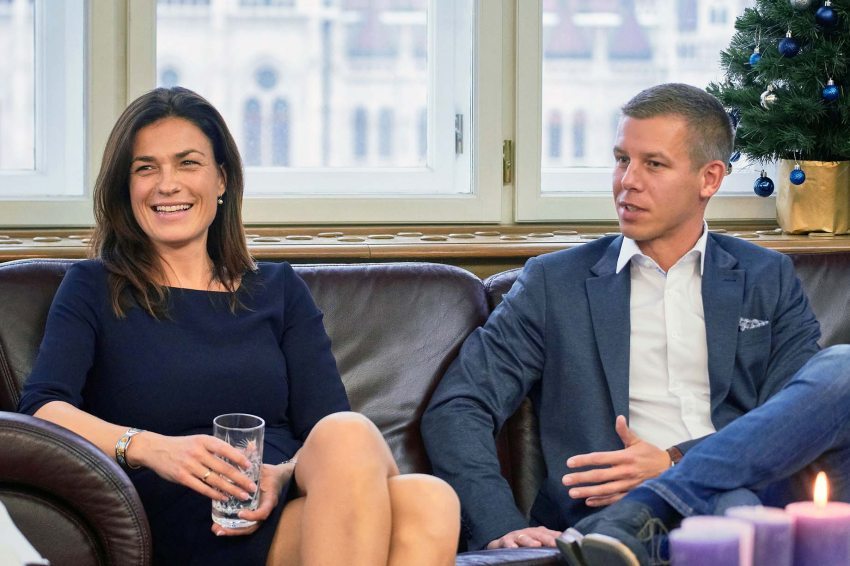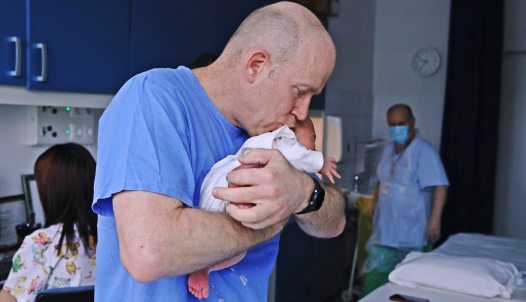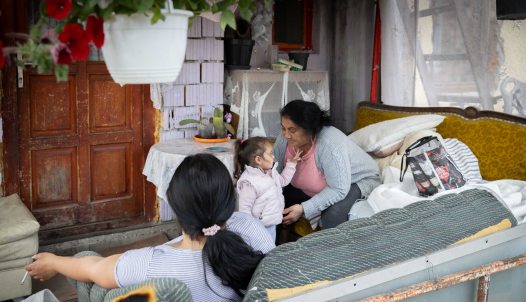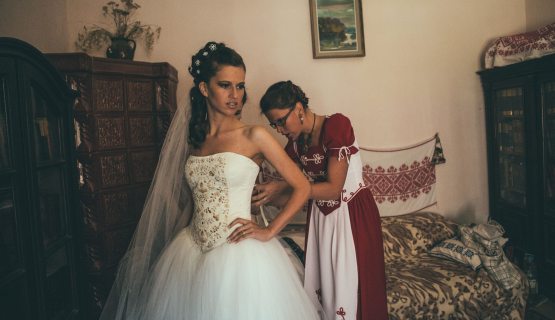In an open cage – interview with Judit Varga and Péter Magyar
This interview was recorded in December, 2019, published in the Képmás print magazine in January, 2020 and in the online kepmas.hu magazine in February, 2020. Please take in to account that it contains information from four years ago.
Judit Varga became Hungary’s justice minister as mother of three young children at the age of 38. Her husband, Péter Magyar, an attorney, diplomat, CEO of Diákhitel Központ Zrt. (Student Loan Zrt.), always provided the conditions whereby his wife could do the best in her profession as well as care for the family. I spoke with them about male-female roles, shaping societal attitudes, Prince Philip syndrome and what great need there would be for feminine qualities in public life.

You are known as being a strong couple. How did your relationship come about?
Judit Varga: “I remember exactly that it was 1 April 2005 when at an attorneys’ party a guy in a brown jacket sat down opposite me – it was Péter. A mutual acquaintance introduced us, we started to chat and in seconds we realized that we imagined our lives according to an identical system of values.
“It was relatively uncommon even then that somebody should date a woman by saying, amongst other things, that they would like to marry and become a parent when still young. Péter made no secret of this and I was very impressed.”
Péter Magyar: “I think it is a good thing to have children when young, on the one hand because a person is still more flexible, they overcome obstacles more easily, and on the other hand, having got past the young children period quickly, we are faced with enormous opportunities.”
Was it always evident that as well as motherhood, you wanted to excel in other areas as well?
Judit: “Yes. I always thought that life didn’t come to a halt after birth – but without children, it would stop! I was never concerned that there wouldn’t be interesting work for me, I always felt that this part of my life would be all right. However, if I didn’t have a family, then there was no sense to the whole thing, so I was more concerned about finding a partner. As a trainee associate, I was highly esteemed in several international practices, the only problem being that I had neither free weekends nor evenings off. From a professional aspect it was an extremely valuable period, I learnt a lot, but I had no time left for my private life. At that time, Péter worked as a court clerk, he finished every day at four in the afternoon, I sometimes came home late in the evening so he was waiting for me with a hot dinner. We felt that this could not go on in the long term. Our relationship became ever more serious and in August 2006 Péter asked for my hand in marriage and we changed our lifestyle.”
Péter: “At the time we talked a lot about what a healthy division of roles between a woman and man in a relationship looked like, even if there could be one. In the end we decided and in a sudden switchover I became a trainee associate, Judit carried on as a court clerk. It was absolutely clear that at that time she stepped back for our relationship.”
Judit: “Then it was 2008 and ‘young mother underground’, which I loved. I enjoyed long morning walks with our son on Sas Hill and I thought how much better this was than working myself to death in an office. This is another very good thing in a woman’s existence, that she can try out several roles. Of course, each evening I really looked forward to meeting up with civilization in the person of Péter. This period spent at home with a baby is a beautiful time but difficult as well, and it is important to speak of this, too.
“I don’t think it is right when one only talks of the happy times because for many, the monotony, the lack of adult communication can be frustrating – particularly when all the mother hears is that this is beautiful, that she has to feel happy in herself every single second of the day.
“By the time Levente was around one year old, I was longing to do something different.”
Then Péter stepped back: he gave up law in the interest of Judit’s career in Brussels, staying at home with their one-year-old child in a strange city. Was this a difficult decision?
Péter: “The decision itself was not difficult because I knew that, despite the low points, Judit also wanted to be at home with Levente and fundamentally this is a good thing. My career here in Hungary was just taking off, although we had always wanted to work abroad for a few years and Judit received an excellent opportunity in Brussels, so we jumped at the chance. After the first few weeks, just being at home – without friends and relatives – was very difficult, my horizons narrowed considerably. Since then I understand and can truly value the sacrifice made by women.
“The dynamic of the life of the partner at home with a child and the spouse going to work are completely different – this was when I understood why so many marriages break down at this time.
“It’s a completely different thing when I can stroll into work in the morning, and there are tough moments but I can drink a coffee alone at any time, in other words, basically I am a free man. Being at home with a small child, trouble can arise at any moment. This period shaped both our characters, it was instructive and it brought us together. I believe that several weeks or months spent at home can be important for every husband, father and it can result in the sort of strong father-child bond that is inconceivable in ‘telework’. Anyway, Judit is always going on about how unjust it is that when the husband goes out to work, he expects that on his return in the evening everything should be tidy, his wife should be dressed nicely, waiting with a cooked meal on the table, if possible the children are asleep – or they are at least quiet. When, however, the man is at home with the child, then the idea of these expectations does not even come up – or at least in her experience. It’s certain that I never waited for her dressed nicely (laughs).”
You rewrote the typical male-female division of labour but how did those around you take it? Didn’t they feel pity for Péter when as a man he stepped back in favour of his wife? Did they ever ask Judit why she couldn’t stay at home with the young children?
Péter: “I never experienced this as a victim, marriage is teamwork, and in fact in Belgium I met about as many fathers in the playground as mothers, so this was not such a big deal there.
“Of course, sometimes my friends have teased me since Judit became a minister, asking me who wears the trousers in our family. At these moments I always quote the husband of Margaret Thatcher, who laughingly replied to similar questions by saying: ‘I wear the trousers. And I wash and iron them, too.’ But when we talk seriously, I rather feel a sense of respect for the fact that we both allow each other to make our own careers. I am convinced that freedom of choice must be allowed for both women and men and the point is for both parties to be satisfied with the setup – if we desire a true demographic turnaround, we still have a long way to go in this respect.”
Judit: “With Péter, I have always been able to experience motherhood, what are traditionally called women’s tasks, as though I were in a cage with an open door: I knew that if I wanted to prove myself in another area, I could always fly out. Péter never expected me to give up anything of the person I am. If the door to the cage had been locked, then it is not certain I would have felt so good in myself, but in this way I was always happy to fly back.
“At the same time, I greatly esteem – and sometimes am slightly jealous of – those women who feel fulfilled by preserving the warmth of home, and it is very disturbing when this is presented as work of a lesser rank or value than a workplace career. This is a tough and responsible job, as any parent knows full well.
“On the other hand, I consider it important that we give the right of choice to every woman and we do not judge those who do not fulfil the mother-role in themselves.”
Yet isn’t it difficult that Péter, as a male manager of a company, has need of the presence of a supportive wife who, I’m sure, is unable to accompany him to every formal event?
Péter: Yes, but this is somewhat of a Prince Philip syndrome. Usually, if one of the spouses runs a major company, then family life adjusts to his/her schedule. Things are slightly different with us because Judit occupies the seat of Ferenc Deák and this is the greatest possible honour and at the same time the greatest responsibility for a Hungarian attorney. But I don’t want to deny that this role is difficult as an energetic man, and sometimes we consider ourselves to be a kind of social experiment: exciting and beautiful, but why is it happening to us? (they laugh) Because it can be heart-breaking if the children start crying when they once again see their mother with a suitcase, and perhaps it is even more difficult for Judit having to hold meetings in this knowledge. At these times I always remember ‘homeland above all else’, we undertook this public service. If our example contributes to a position when in a few years’ time in Hungary it won’t be abnormal if a woman undertakes a leading position in public life alongside motherhood, or even with a large family, then we will not have lived in vain. I reckon the key is to be sought in finding the right companion, but it is important that the reinterpretation and transformation of roles does not result in chaos.”
And Judit, what is it like not being able to be the supportive wife on every occasion, indeed, now Péter has the supportive role?
Judit: “I’m not very keen on events where we are seated separately. Naturally it is hard that Péter is frequently in a supportive status and I am sorry that I cannot always accompany him to important events. But we don’t only appear a strong couple from the outside, we are tempered within as well (they laugh). It is important for me that a husband should be a man and a wife a woman. As to how they complement one another, that depends on the couple, I reckon. I consider it important to keep the rhythm together, and always the one should move forward or sideways as the situation demands.”
Judit, when are you able to live the traditional feminine role?
Judit: “For example, I really love being able to clear the table after a dinner with friends so that the men can talk, I like washing up, I clean the spots from clothes and I like dressing prettily. And of course, one of the most atmospheric things is when I can make dinner on a summer evening in the kitchen of our house on the Balaton.
“I consider order in the family to be very important, that the children know where to find everything – I think this is fundamental to their spiritual stability. And order is vital in their everyday life as well: that everything goes smoothly with the music classes and sports, which are important in character shaping.
“It is not definitely school but rather these that teach them fair play, humility, teamwork, that we should always appear less than we actually are – if these are missing in their childhood, then they won’t have the tools to be happy as an adult. If I have to take part in a cabinet meeting, if I have not managed to organize these for the children, then I cannot feel as self-confident as when I know that my heartland is stable. Because in this case there can’t be major problems and ‘all’ I have to do is answer questions that arise at the cabinet session.”
Péter: “In fact, while we were living in Brussels our two younger sons were born and once again Judit took one step back while I moved up a rung on the diplomatic ladder.”
Judit: “Yes, in effect for years I’ve been on the backburner. Péter travelled a great deal so that in those years I held the front at home, but this was a very lovely time as well. With young children I had the ideal work, because in the afternoon I took them to football training and music classes, indeed, I headed up the parental community at the school in Brussels for a year. We often look back with a measure of nostalgia on those happy and – compared to our current life – certainly calmer years, but in the meantime we feel that God places that burden on each of us that we are capable of bearing.”
As a minister, in what way are you different to a man?
Judit: “In my vocation, for me it is not important to annihilate in a macho way the other party during a discussion, but to somehow reach a compromise. I have found that we women, during our life, so many times experience the physical and emotional depths – let’s just think of pregnancy, giving birth, being at home – that we have less tendency to be big headed, we have more humility in us. We are more emotional and thus our approach is different to that of men. This is also needed in public life. Of course, not on the basis of quotas but on aptitude.
“According to the statistics, mothers with several children are above-average efficient workers. Of course, as a mother it is tough that I am frequently far from my children, but for them this is normal because they grew up with it. We are their parents and I consider it most important that we remain ourselves.
“I believe that if we stick together, we can jointly bring up our three sons to be happy adults.”






